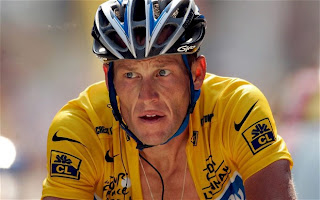Ever since he decided not to contest the dope taint
complaint in August last year, it became clear that cyclist Lance Armstrong had
many skeletons in his closet. But even then many of his loyalists had felt that
the guy has been unfairly hounded by authorities for too long and he was fed
up. After all the seven-time Tour de France winner was never officially caught
for doping, though allegations shadowed him all along.
Finally he admitted to taking performance enhancing drugs
and that too in America's most visible confessional chamber - The Oprah Winfrey
show. In the first part of the interview he admitted taking drugs to win all
the Tour de France titles and called himself a 'flawed character'. To many of
his admirers, especially those battling cancer and see him as role model, it
was a moment of deep disillusionment. Whatever residual hope they may have had
about his innocence got snuffed out.
In his overriding ambition to script a perfect American
dream myth, he won the first battle - against testicular cancer - quite
honourably, but took recourse to a venal path to win the most punishing event
in the modern sporting arena. Tour de France participants have to pedal a
distance of 3,497 kilometres covering stretches of Italy and Switzerland, in
addition to France. The route passes through mountainous stretches of Pyrenees
and Alps.
The seven-time winner admitted that his illustrious feat
would have been humanly impossible without doping and he did not ‘invent’ that
culture. One cannot dispute him as the Tour is scarred by a long list of dope
cheats and the recent ones include Tour winners such as Armstrong's compatriot
Floyd Landis (2006) and Spaniard Alberto Contador (2010). But they all got punished, whereas this guy all through these years managed to take doping authorities and his hero-worshipping fans for a ride. And even now his so called confession looks more like a selective leak. He argument is based on the premise that since everyone was doing it, there was nothing wrong in what he did.
Quite predictably it created a commotion in the sporting
world. 'Djoker' Novak Djokovic, more known for his horseplay on tennis court, was
perhaps the most vociferous in his comments and wanted all of Armstrong's
titles taken away and added that he should suffer for his lies. Former basketball
legend Magic Johnson lamented that Armstrong has let down the sport and fans,
but commended him for 'couragesouly coming forward' to admit his guilt.
Perhaps the person who ought to feel the most vindicated was
David Walsh, chief sports writer for Britain's The Sunday Times, who has
been pursuing Armstrong ever since he won his first Tour in 1999. He reportedly sat glued to
television, though the interview was telecast in Britain at 2 am.
Walsh lauded the witnesses he spoke to in his years of
investigation into Armstrong and who were vilified for telling the truth. The
newspaper also stood by Walsh all these years.
Armstrong had sued The Sunday Times and in 2006 the
newspaper settled the case for more than $500,000 after spending more than $1
million in legal fees. They quite rightly now want the money back - with
interest.


